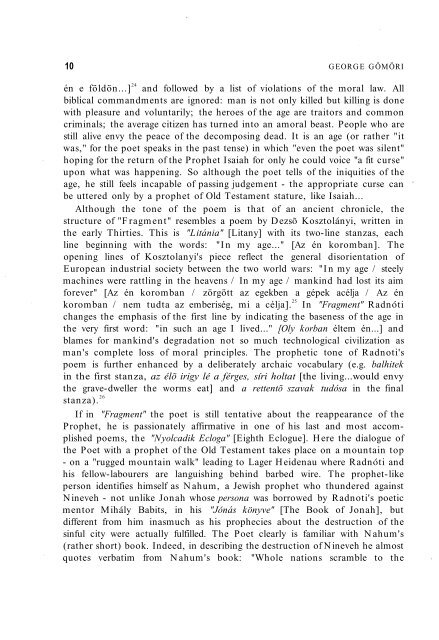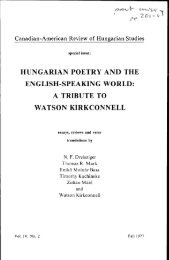HUNGARIAN STUDIES 11. No. 1. Nemzetközi Magyar ... - EPA
HUNGARIAN STUDIES 11. No. 1. Nemzetközi Magyar ... - EPA
HUNGARIAN STUDIES 11. No. 1. Nemzetközi Magyar ... - EPA
- No tags were found...
You also want an ePaper? Increase the reach of your titles
YUMPU automatically turns print PDFs into web optimized ePapers that Google loves.
10 GEORGE GÖMÖRIén e földön...] 24and followed by a list of violations of the moral law. Allbiblical commandments are ignored: man is not only killed but killing is donewith pleasure and voluntarily; the heroes of the age are traitors and commoncriminals; the average citizen has turned into an amoral beast. People who arestill alive envy the peace of the decomposing dead. It is an age (or rather "itwas," for the poet speaks in the past tense) in which "even the poet was silent"hoping for the return of the Prophet Isaiah for only he could voice "a fit curse"upon what was happening. So although the poet tells of the iniquities of theage, he still feels incapable of passing judgement - the appropriate curse canbe uttered only by a prophet of Old Testament stature, like Isaiah...Although the tone of the poem is that of an ancient chronicle, thestructure of "Fragment" resembles a poem by Dezső Kosztolányi, written inthe early Thirties. This is "Litánia" [Litany] with its two-line stanzas, eachline beginning with the words: "In my age..." [Az én koromban]. Theopening lines of Kosztolanyi's piece reflect the general disorientation ofEuropean industrial society between the two world wars: "In my age / steelymachines were rattling in the heavens / In my age / mankind had lost its aimforever" [Az én koromban / zörgött az egekben a gépek acélja / Az énkoromban / nem tudta az emberiség, mi a célja]. 25In "Fragment" Radnótichanges the emphasis of the first line by indicating the baseness of the age inthe very first word: "in such an age I lived..." [Oly korban éltem én...] andblames for mankind's degradation not so much technological civilization asman's complete loss of moral principles. The prophetic tone of Radnoti'spoem is further enhanced by a deliberately archaic vocabulary (e.g. balhitekin the first stanza, az élő irigy lé a férges, síri holtat [the living...would envythe grave-dweller the worms eat] and a rettentő szavak tudósa in the finalstanza). 26If in "Fragment" the poet is still tentative about the reappearance of theProphet, he is passionately affirmative in one of his last and most accomplishedpoems, the "Nyolcadik Ecloga" [Eighth Eclogue]. Here the dialogue ofthe Poet with a prophet of the Old Testament takes place on a mountain top- on a "rugged mountain walk" leading to Lager Heidenau where Radnóti andhis fellow-labourers are languishing behind barbed wire. The prophet-likeperson identifies himself as Nahum, a Jewish prophet who thundered againstNineveh - not unlike Jonah whose persona was borrowed by Radnoti's poeticmentor Mihály Babits, in his "Jónás könyve" [The Book of Jonah], butdifferent from him inasmuch as his prophecies about the destruction of thesinful city were actually fulfilled. The Poet clearly is familiar with Nahum's(rather short) book. Indeed, in describing the destruction of Nineveh he almostquotes verbatim from Nahum's book: "Whole nations scramble to the
















